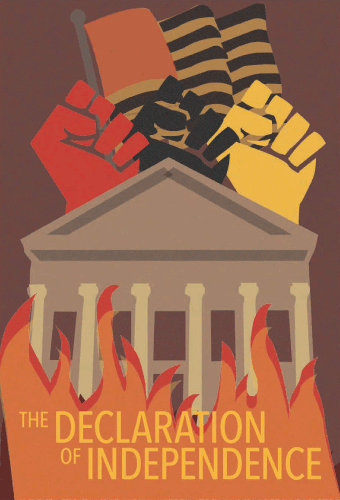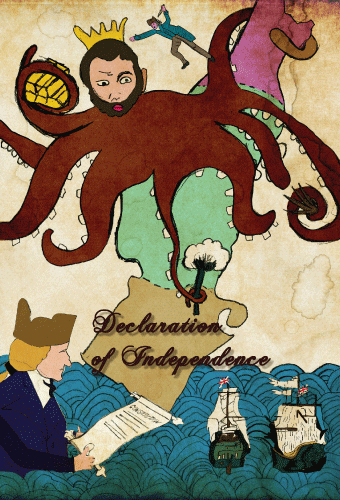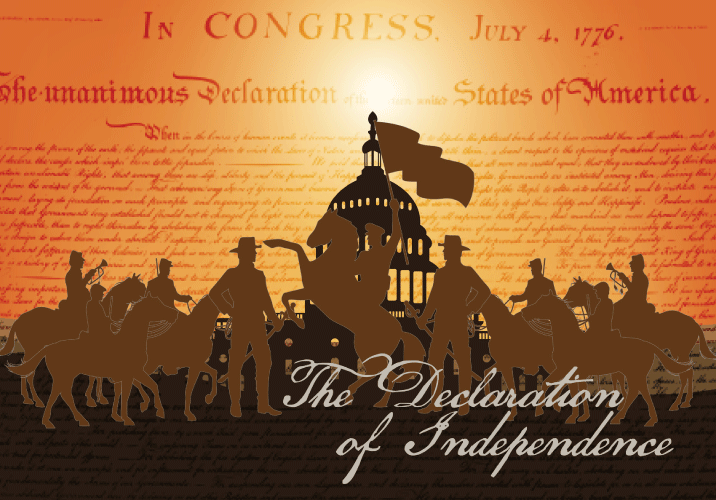American Revolutionary Documents
Themes
- Revolution/Radicalism vs. Conformity
- Freedom
- Justice
- Citizenship
- Rights
Instructor Resources
Primary Sources:
https://www.archives.gov/founding-docs/declaration-transcript
Constitution:
https://www.archives.gov/founding-docs/constitution-transcript
Bill of Rights, Amendments 1-10:
https://www.archives.gov/founding-docs/bill-of-rights-transcript
**Especially Amendments 1, 2, 3, 4, 6, 8
Amendments 11-26:
https://www.archives.gov/founding-docs/amendments-11-27
**Especially Amendments 13, 14, 15, 16, 19
Locke’s Second Treatise vs. Declaration: Here
Columbia University: https://www.college.columbia.edu/core/content/american-revolution-and-founding-texts
Blackboard Discussion Questions
Madison & Federalist:
- What factions exist in our culture today? Do any take over and suppress the minority, as Madison predicted they could?
- Do you think that Madison was right in his argument that to reduce the power of individual factions, a government needs more pluralism, a large society with many different views? Has our country worked this way in the past? Does it work this way now?
- What are 2 or 3 current examples that you’ve observed or noticed in American society that support Madison’s views on factions? Are there any examples you’ve observed that complicate or challenge Madison’s views on how to address factionalization?
Declaration of Independence
Writing and Discussion Activities
READING & LISTENING:
- Read the Declaration of Independence
- Listen to the Declaration of Independence
- Randy Barnett, article in The Declaration of Independence Annotated
RESOURCES:
- The City Tech Library’s Guide to Developing a Research Question
Writing
Analyzing the Declaration of Independence & Brainstorming Research Topics
Write a Post/Submit an Assignment that includes the following:
- Find one moment in this document where you feel the authors’ argument is particularly compelling: quote or paraphrase the section and explain why you think the writing is convincing.
- Think about The Declaration of Independence in modern terms. Write a paragraph explaining how the arguments in this founding document are relevant to you and relate to issues that affect you, your family, and/or your community in the 21st century. If you feel the document is completely irrelevant to your life, explain your reasoning.
Respond to this Discussion Topic: The individuals who composed and signed The Declaration of Independence were willing to lose everything and be tried as traitors to their country.
- With the idea of fighting for your beliefs and values in mind, consider controversial issues that affect you. You might think about events, laws, policies, rules, regulations, and social and political movements that have caught your attention (and that have more than one side). Avoid typical topics (like the death penalty, abortion, and violent video games). Really search for an issue—local, national, global—that you feel is important and want to know more about; the goal here is not to know your position beforehand but to use research to help you decide where you stand on an issue. Brainstorm a list of two or three topics: for each issue write one or two questions that come to mind. Consult City Tech Library’s Guide to Developing a Research Question to help you with this assignment.
Student Work
DD114 Digital Illustration in collaboration with Core Books at Hostos
Professor Catherine Lewis | Fall 2021

ARIEL SANTANA
DD114 Digital Illustration | Fall 2021

CESAR RIOFRIO
DD114 Digital Illustration | Fall 2021

WILLIAM SANTANA
DD114 Digital Illustration | Fall 2021
Informal Assignments:
Douglass & Madison
Suggested Pre-Unit Prompt(s) – Federalist 10
- Describe American politics today LOLOLOL. Yes, I *know* BUT LOL. Also, yes, when you say “I don’t really pay attention or follow that stuff” then describe what you understand American politics to be and expand on why you don’t follow. There’s wisdom in your answers and in your avoidance. Go there.
- What major ideas contributed to the formation of America as an idea and a nation? What do those ideas suggest about America as a place?
- How is that different from America’s role or perceived role as a nation?
- What is your role as a thinker, reader, writer, and student in America?
- How is that different from your place as a human in America?
- In what ways is that point of origin at odds or in line with the American way?
- Were you aware that there is a distinction between Democracy and democracy?
Resources for Discussion of Federalist Paper #10:
https://www.khanacademy.org/humanities/us-government-and-civics/us-gov-foundations/us-gov-government-power-and-individual-rights/v/federalist-papers-10-part-1 and part 2: https://www.khanacademy.org/humanities/us-government-and-civics/us-gov-foundations/us-gov-government-power-and-individual-rights/v/federalist-papers-10-part-2
Further Background: https://study.com/academy/lesson/federalist-no-10-summary-significance.html
Background on Madison: https://www.college.columbia.edu/core/content/james-madison
- What does Madison mean when he uses the terms justice and injustice?
- What does he say is the principal role of government?
- What interferes with justice when two parties (factions) disagree?
- What is a republic? How does it differ from pure democracy?
- How does a Madison believe a republic can defend against factions?
- What solutions does Madison pose as ways of preventing factions from emerging?
- What are the advantages and disadvantages of a small republic? Of a large republic?
- Who was the intended audience of this document?
- What was the purpose of this document? Whom is Madison trying to convince here?
- Is Madison (ironically) representing a factional interest in this paper?
- How does the institution of American slavery factor into Madison’s argument?
- Madison cautions against pure democracy. What points does he make about the problems of pure democracy? Why does he believe in its ultimate failure? Are his points valid?
- In paragraph 9, Madison mentions that “Enlightened statesmen will not always be at the helm” of the republic, and that “immediate interests” may overwhelm long-term thinking. What does this tell us about the purpose of having a constitution?
Essay Assignments
- Given that the Federalist papers were written during the era of slavery, it is difficult to ignore the important role property plays in Madison’s argument. Do you think Madison’s argument upholds the rights of slaves, or of slaveholders? Does it have any bearing on slavery at all? Explain.
- The Declaration of Independence, the Bill of Rights, and Locke’s Second Treatise of Government all talk about freedom. How does each text fail or succeed to give freedom to all? Quote or paraphrase from all three sources to make your case about what they say about freedom/liberty.

This entry is licensed under a Creative Commons Attribution-NonCommercial-ShareAlike 4.0 International license.


